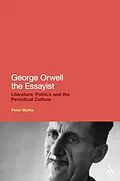Autorentext
Peter Marks is Senior Lecturer in English at the University of Sydney, Australia. He wrote British Filmmakers: Terry Gilliam (Manchester University Press, 2009), co-edited Literature and the Contemporary (Longmans, 1999) and has written articles and chapters on such topics as George Orwell, the essay, 1930s British and American literature, periodicals, surveillance, and film adaptation.
Zusammenfassung
George Orwell is acclaimed as one of Englishliterature's great essayists. Yet, while many are considered classics, as abody of work his essays have been neglected. Peter Marks provides the firstsustained study of Orwell the essayist, giving these compelling pieces thecritical attention they merit. Orwell employed the essay as a tool to entertain, illuminate andprovoke readers across an array of topics. Marks situates the essays in theiroriginal contexts, exploring how journals influenced the type of essay Orwellwrote. Acknowledging this periodical culture helps explain the tactics Orwellemployed, the topics he chose and the audiences he addressed. Orwell's firstand last published works were essays, providing evidence of the development ofhis cultural and political views over two decades. Essays helped him fashion his distinctiveliterary 'voice' and Mark traces how their afterlife contributes to Orwell'sposthumous reputation. Arguing the essays are central to Orwell's enduringliterary, political and cultural value, Marks shows how we understand thecomplexities, subtleties, and contradictions of Orwell better when weunderstand his essays.
Inhalt
Acknowledgments \ Introduction: Orwell, the Essay and the Periodical Culture \ 1. From Blair to Orwell: Finding a Voice (1931-6) \ 2. The Radicalised Orwell: From Spanish to Global Conflict (1937-9) \ 3. Orwell in Wartime: Socialism, Patriotism and Cultural Threat (1940-5) \ 4. Orwell and the Uncertain Future (1946-50) \ 5. The Posthumous Orwell and the Afterlife of the Essays \ Bibliography \ Index \
